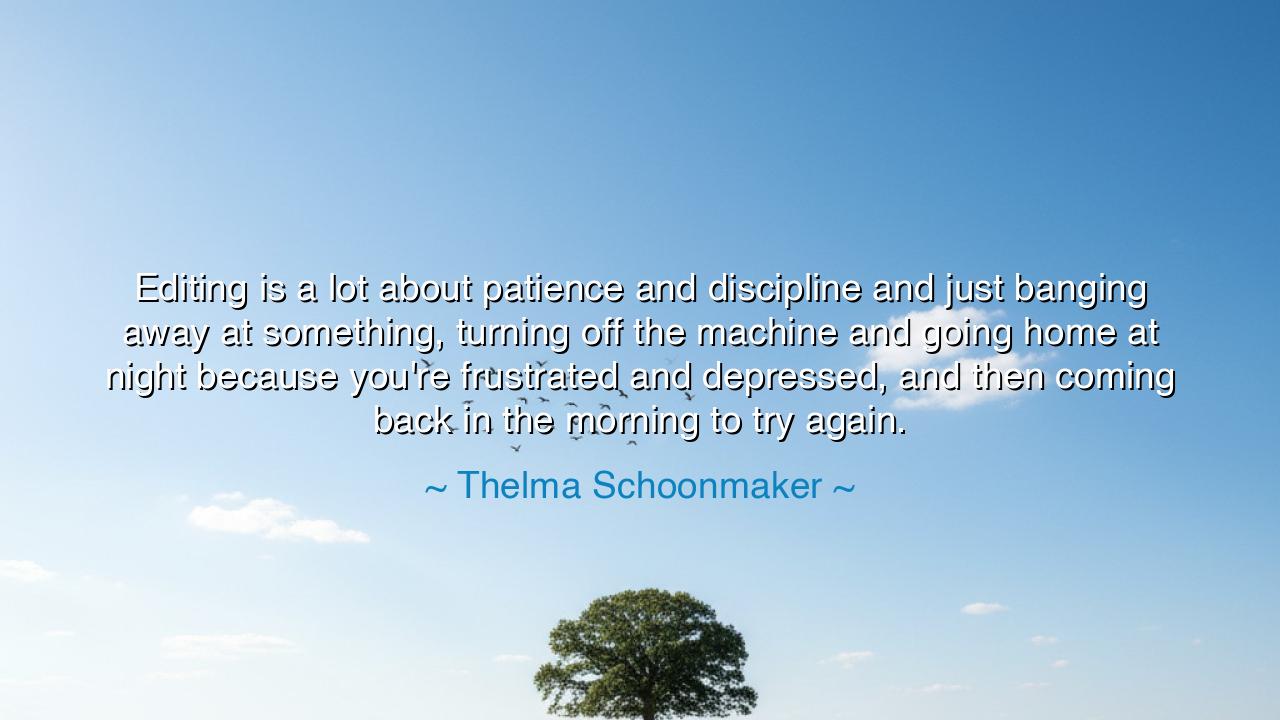
Editing is a lot about patience and discipline and just banging
Editing is a lot about patience and discipline and just banging away at something, turning off the machine and going home at night because you're frustrated and depressed, and then coming back in the morning to try again.






The words of Thelma Schoonmaker — “ing is a lot about patience and discipline and just banging away at something, turning off the machine and going home at night because you're frustrated and depressed, and then coming back in the morning to try again.” — are the confession and commandment of the craftsman’s soul. They speak not only to the labor of the film editor, but to every artist, thinker, and maker who has wrestled with creation itself. Her voice carries the weary grace of one who has learned that mastery is not born in moments of triumph, but forged in the long night of persistence, when hope flickers like a dying flame and yet the hand continues to move.
In these words, Schoonmaker reveals the sacred rhythm of discipline — the ancient pulse that beats beneath all great work. To create anything of meaning, whether a film, a book, or a life itself, one must endure the quiet agony of repetition. The act of “banging away” is not brute effort alone, but a ritual of devotion. The editor sits before the endless reel of images, shaping chaos into clarity, just as the sculptor chips marble until the divine form emerges. Each cut, each choice, is a prayer to patience. The machine she speaks of is not only the tool of her trade — it is the heart of creation itself, demanding both obedience and rebellion, frustration and faith.
The ancients understood this truth. Consider Michelangelo, who labored for years on the ceiling of the Sistine Chapel, neck bent, eyes stinging from paint and dust. He too must have known the weariness of Schoonmaker’s night — that moment when the body aches and the soul whispers, “Enough.” Yet he returned each morning, not because the task was easy, but because it was holy. The divine lives not in comfort, but in perseverance. For it is in the moment we wish to quit that our true work begins. This is the secret of all creation: that beauty is born not of inspiration alone, but of endurance.
Schoonmaker’s words are also a lesson in humility. To leave one’s work unfinished, to walk away in frustration and depression, is not failure — it is wisdom. For every artist must learn the discipline of rest, the grace of stepping back when the spirit is weary. The dawn of new understanding often comes only after the surrender of night. She reminds us that the heart of creation beats in cycles: exertion, exhaustion, renewal. The true craftsman is not the one who never falters, but the one who falters, rests, and returns.
There is, too, a quiet heroism in her confession — a courage not of conquest, but of constancy. To face the same work each morning, knowing it will again test your patience, your confidence, your very sense of worth, is to engage in a noble struggle. This is the hero’s journey not upon battlefields, but in studios, libraries, and lonely rooms. It is the heroism of all who choose creation over comfort, progress over pride. Thelma Schoonmaker’s work, stitched invisibly into the films of Martin Scorsese, is proof that greatness is not always loud — sometimes it whispers from the shadows, behind each frame, behind each cut.
Her words speak beyond the art of editing. They speak to life itself. Every human endeavor — every relationship, every dream, every act of self-discovery — demands the same rhythm of persistence and pause, frustration and return. The world tempts us to seek immediacy, to believe that genius strikes like lightning. But Schoonmaker reminds us that lightning is only seen because the sky has been dark for so long. True creation, true success, is the art of trying again — of believing that tomorrow’s effort will redeem today’s despair.
And so the lesson is this: do not mistake struggle for failure. When the work defeats you, when you walk away disheartened, know that you are still upon the sacred path. Rest, breathe, return. For the gods favor not the swift, but the steadfast. The sculptor, the writer, the editor, the dreamer — all must endure the rhythm of creation’s tide. Be patient. Be disciplined. Allow frustration to season your resolve, not poison it. Then, when morning comes, sit again before your task. Strike the stone once more, cut the frame once more, shape the moment once more. For in that endless returning lies the secret of immortality — the quiet triumph of the persistent heart.






AAdministratorAdministrator
Welcome, honored guests. Please leave a comment, we will respond soon